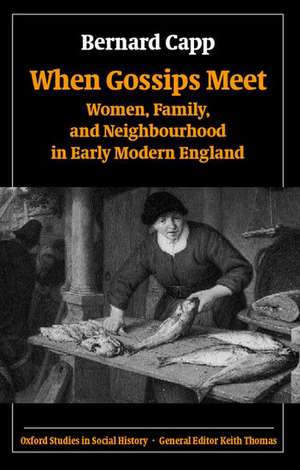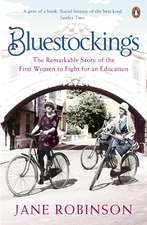When Gossips Meet: Women, Family, and Neighbourhood in Early Modern England: Oxford Studies in Social History
Autor Bernard Cappen Limba Engleză Paperback – 15 iul 2004
| Toate formatele și edițiile | Preț | Express |
|---|---|---|
| Paperback (1) | 473.57 lei 31-37 zile | |
| OUP OXFORD – 15 iul 2004 | 473.57 lei 31-37 zile | |
| Hardback (1) | 1257.24 lei 31-37 zile | |
| OUP OXFORD – 16 ian 2003 | 1257.24 lei 31-37 zile |
Din seria Oxford Studies in Social History
- 34%
 Preț: 1462.24 lei
Preț: 1462.24 lei - 22%
 Preț: 404.92 lei
Preț: 404.92 lei - 31%
 Preț: 431.59 lei
Preț: 431.59 lei - 22%
 Preț: 362.79 lei
Preț: 362.79 lei - 34%
 Preț: 555.79 lei
Preț: 555.79 lei - 29%
 Preț: 630.99 lei
Preț: 630.99 lei - 34%
 Preț: 674.11 lei
Preț: 674.11 lei - 27%
 Preț: 408.75 lei
Preț: 408.75 lei - 27%
 Preț: 377.65 lei
Preț: 377.65 lei - 34%
 Preț: 1256.69 lei
Preț: 1256.69 lei - 21%
 Preț: 408.11 lei
Preț: 408.11 lei - 27%
 Preț: 391.81 lei
Preț: 391.81 lei - 34%
 Preț: 1053.58 lei
Preț: 1053.58 lei - 14%
 Preț: 391.13 lei
Preț: 391.13 lei - 34%
 Preț: 938.25 lei
Preț: 938.25 lei - 34%
 Preț: 981.98 lei
Preț: 981.98 lei - 34%
 Preț: 850.10 lei
Preț: 850.10 lei
Preț: 473.57 lei
Preț vechi: 654.79 lei
-28% Nou
Puncte Express: 710
Preț estimativ în valută:
90.63€ • 94.27$ • 74.82£
90.63€ • 94.27$ • 74.82£
Carte tipărită la comandă
Livrare economică 03-09 aprilie
Preluare comenzi: 021 569.72.76
Specificații
ISBN-13: 9780199273195
ISBN-10: 0199273197
Pagini: 412
Dimensiuni: 138 x 217 x 24 mm
Greutate: 0.49 kg
Ediția:Revised
Editura: OUP OXFORD
Colecția OUP Oxford
Seria Oxford Studies in Social History
Locul publicării:Oxford, United Kingdom
ISBN-10: 0199273197
Pagini: 412
Dimensiuni: 138 x 217 x 24 mm
Greutate: 0.49 kg
Ediția:Revised
Editura: OUP OXFORD
Colecția OUP Oxford
Seria Oxford Studies in Social History
Locul publicării:Oxford, United Kingdom
Recenzii
...a top notch book...is jam-packed with good material and it has a string of well backed-up arguments that the rest of us now need to take on board and work with.
All social and cultural historians of early modern England will find much of interest in Professor Capp's wonderfully written account of the hidden stories of women's accommodation and resistance to patriarchy.
All social and cultural historians of early modern England will find much of interest in Professor Capp's wonderfully written account of the hidden stories of women's accommodation and resistance to patriarchy.













